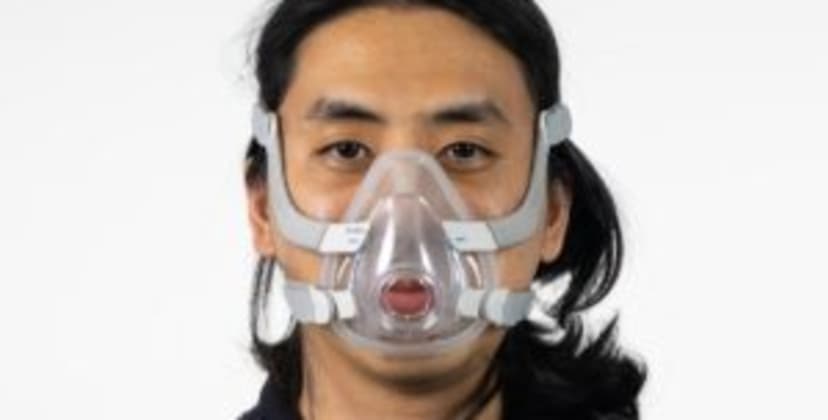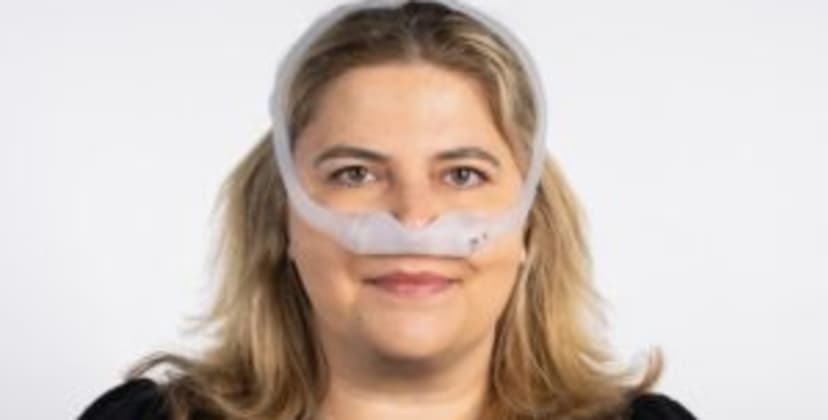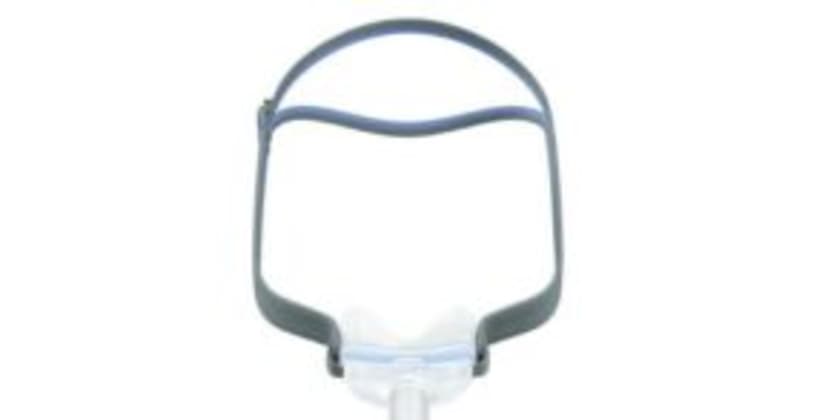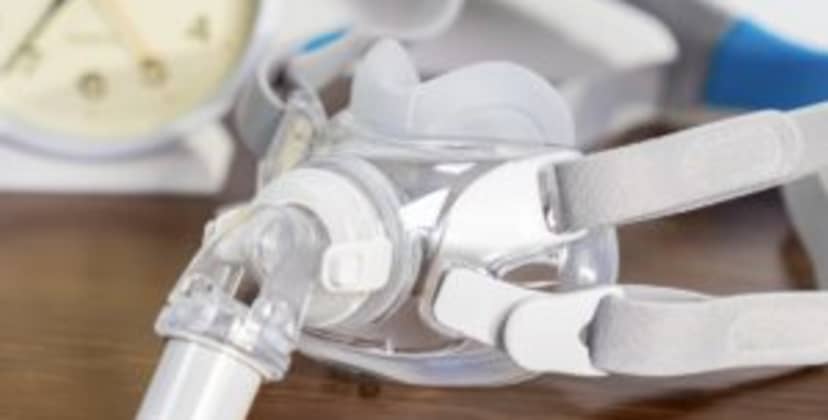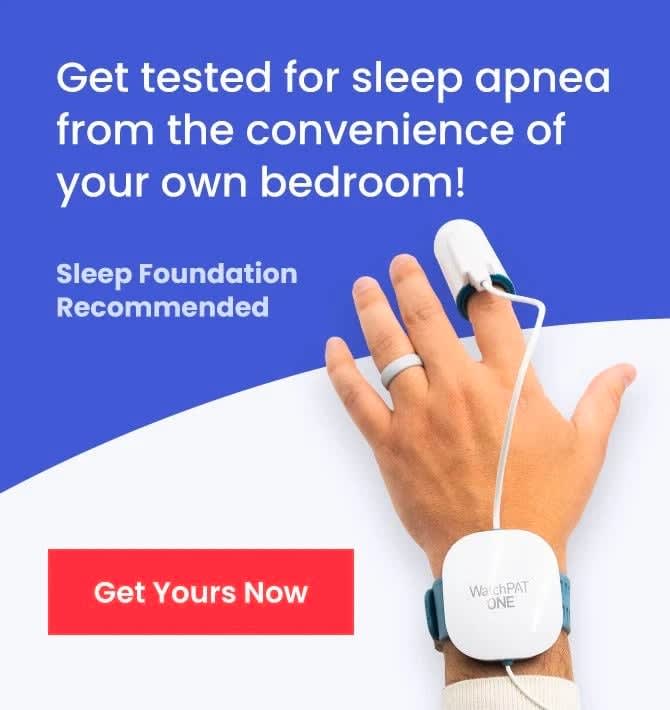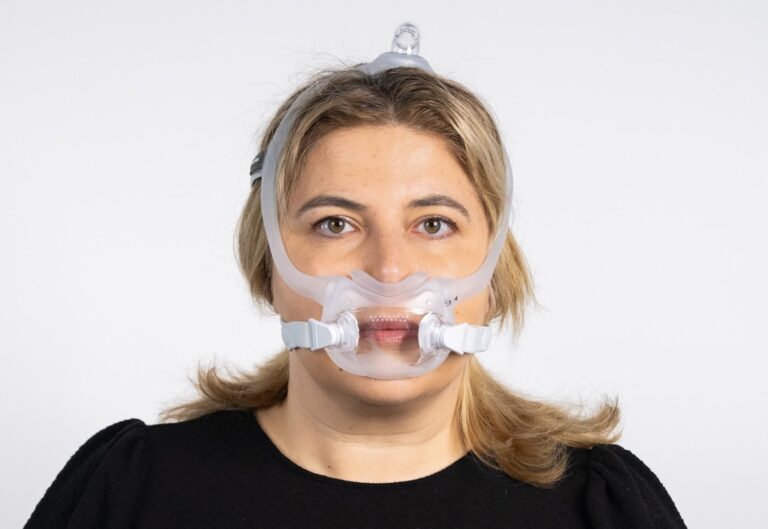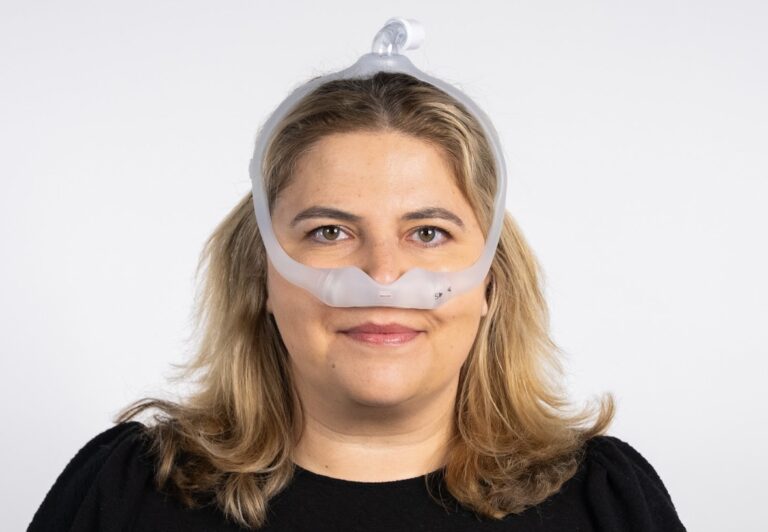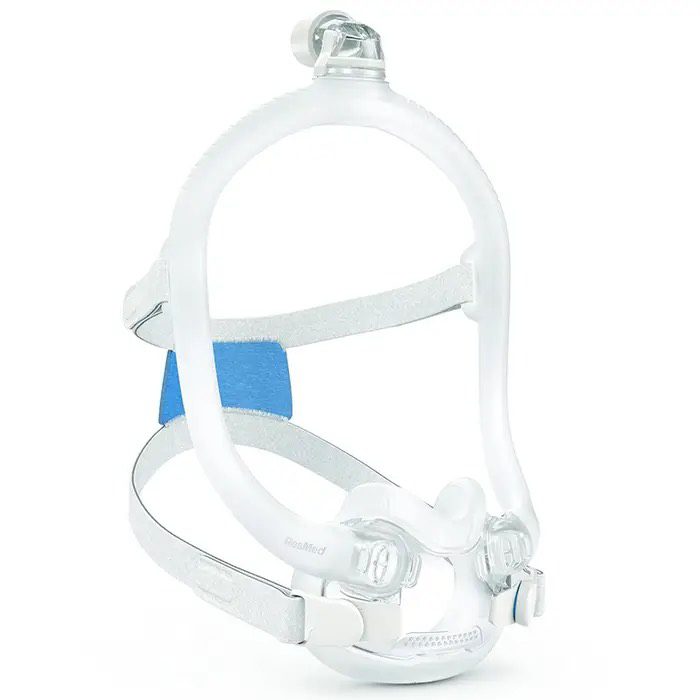When you buy through our links, we may earn a commission. Products or services may be offered by an affiliated entity. Learn more.
Best CPAP Masks of 2024
Expert Tested & Sleeper Approved
A CPAP mask is an essential accessory for continuous positive airway pressure therapy. But with many mask types and brands available, you may find it hard to identify the best CPAP mask.
To treat sleep apnea, pressurized air has to travel from your CPAP machine through a hose and a mask and into your upper airway. CPAP therapy won’t be effective if your mask leaks air, falls out of place, or is simply too uncomfortable to wear throughout the night.
Finding the right CPAP mask depends on factors like your sleeping position and the severity of your sleep apnea symptoms. We’ll highlight what to look for when shopping for a mask, including different types of masks and who’s typically a good fit for each. We’ll also share our picks for the best CPAP masks in several categories.
What’s the Best CPAP Mask?
Full-face masks make a lot of facial contact, so it’s crucial to find one that doesn’t cause skin irritation. While most masks use silicone cushions, we were impressed by the memory foam design of the ResMed AirTouch F20, which gently molds to the face for a more comfortable fit.
Our Top Picks for CPAP Masks
In-Depth Reviews
Best Overall
ResMed AirTouch F20 Full Face CPAP Mask with Headgear
Use this link for the most current ResMed discount
Shop Now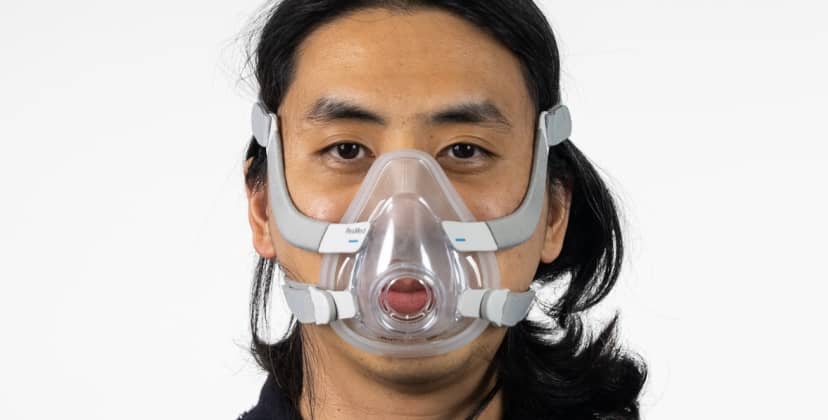
The ResMed AirTouch F20 takes a new approach to full face masks with adaptive memory foam cushions, flexible elastic straps, and a design that allows full visibility. This mask is a great option for anyone who has full-face masks irritating or uncomfortable in the past.
-
Pros
-
Memory foam cushion is softer and more adaptive than silicone
-
Six sizes fit different facial structures
-
Lack of forehead strap enables full line of sight
-
-
Cons
-
May be uncomfortable for side sleepers
-
Shouldn’t be used by people with medical implants that interact with magnets
-
Price
$154
For many CPAP users, full face masks are a constant source of discomfort due to silicone cushions that irritate the nostrils and bulky headgear. If this applies to you, you’re an excellent candidate for the ResMed AirSense F20. This mask features cushions made of memory foam that feel softer and more adaptive than silicone, while the headgear consists of elastic straps that mold to your face. You can also choose from six different sizes, ensuring most people can find a model that fits comfortably and securely.
What Does It Do?
Four elastic, adjustable straps with magnetic clips allow you to customize the mask’s fit easily. These straps make the headgear feel relatively lightweight. ResMed offers two size categories — “standard” and “for her” — each with small, medium, and large options. This size selection is fairly extensive compared to other full face masks on the market today. All masks come with soft memory foam cushions, but you can swap in silicone cushions if you wish. An elbow port allows you to attach and detach the connective hose with ease.
Who It’s Best for
Those who experience irritation in their nostrils due to rigid silicone pillows should enjoy the AirSense F20’s memory foam cushions. Unlike many competing masks, this model does not include a forehead strap. This provides full visibility when reading or watching TV before bed. Thanks to the wide size range, most men and women should be able to find at least one design that feels comfortable.
The AirSense F20 is fairly affordable and standard shipping is free for all U.S. orders. Unused masks may be returned within 60 days of receipt.
Disclaimer: In November 2023, ResMed issued a safety notice cautioning that the magnetic clips on this model and other ResMed masks should be kept at least 6 inches away from any implanted medical device that may be affected by magnets, including pacemakers and insulin pumps. The company also warns that other metallic implants such as valves, stents, and certain dental implants may be impacted by the magnetic clips.
Best Nasal Pillow Mask
Philips Respironics DreamWear Nasal Pillow CPAP Mask with Headgear
Use this link for the most current Philips Respironics discount
Shop Now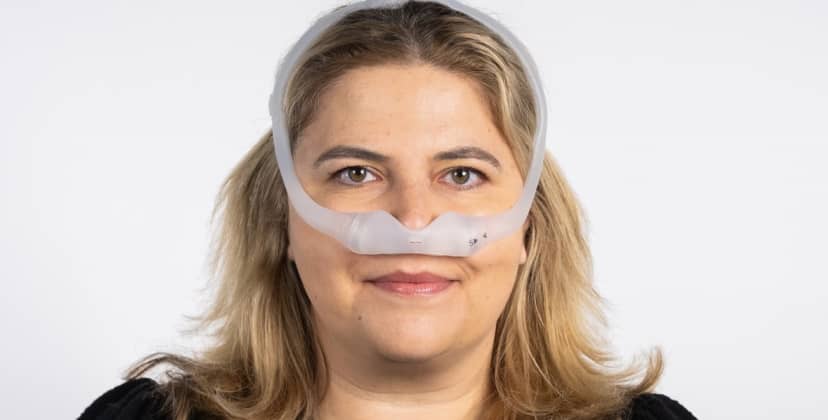
We give the DreamWear Nasal CPAP Mask high marks for a design that helps it stay put through the night, even for restless sleepers. If you toss and turn a lot during sleep, this mask is worth checking out.
-
Pros
-
Unobtrusive nasal pillow design
-
Top-of-head tubing connection is great for active sleepers
-
Frame is also compatible with nasal cradle and full-face cushions
-
-
Cons
-
Airflow through the hollow mask frame may be too noisy for light sleepers
-
Direct airflow through the nasal pillows may be too harsh for CPAP users with high air pressure settings
-
Price
$109
Made by Philips Respironics, the DreamWear Nasal CPAP Mask is a nasal pillow style mask that’s designed to accommodate active sleepers. Like other nasal pillow masks, the DreamWear has a low-profile design that creates a seal at the base of the nostrils and makes minimal contact with your face, optimizing comfort.
What Does It Do?
The DreamWear features several clever design elements for sleepers who toss and turn in their sleep. Unlike many other nasal pillow masks, the DreamWear’s tubing attaches to a swivel connector at the top of the head. This gives the tubing greater freedom of movement and also makes it less likely to become tangled and disturb your mask’s seal if you move around in your sleep. It’s available in three sizes: small, medium, and large.
Who It’s Best for
The DreamWear features a slip-resistant frame that helps to keep the nasal pillow in place and securely sealed, even if you sleep on your side or stomach. The combination of the DreamWear’s soft, flexible silicone nasal pillow and its cushioned head strap make this a comfortable option. The mask is compatible with all CPAP machines and connects with standard CPAP tubing. With a mid-range price for a nasal style CPAP mask, the DreamWear is also a great value.
This mask is protected by a 60-day trial period, during which unused masks may be returned. Ground shipping is free of charge for U.S. customers.
Best Nasal Mask
ResMed AirFit N30 Nasal CPAP Mask
Use this link for the most current ResMed discount
Shop Now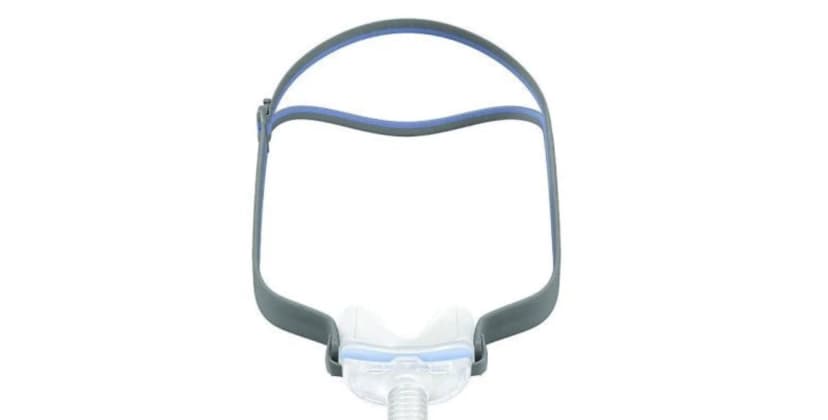
ResMed’s AirFit N30 is a standout nasal CPAP mask thanks to its lightweight and streamlined design, comfortable silicone cushions, and wide range of size options. QuietAir is another notable feature — this technology muffles noise from your CPAP machine to help you sleep throughout the night.
-
Pros
-
Low profile ensures adequate airflow without blocking your line of sight
-
Flexible elastic headgear provides a secure, comfortable fit
-
Available in three cushion sizes
-
-
Cons
-
Not suitable for CPAP users who need high pressure settings
-
Contact with the nasal passages can lead to irritation and congestion
-
Price
$105
If you don’t need high pressure settings for your CPAP therapy, a nasal mask should deliver adequate airflow without completely covering your nose and mouth or obstructing your line of sight. ResMed’s AirFit N30 offers an ultra-slim profile with minimal contact to your face and a flexible, lightweight fit. At the same time, the cushions form a secure seal around both nostrils — this ensures steady, uninterrupted airflow throughout the night.
What Does It Do?
The AirFit N30 is engineered with QuietAir Technology, which reduces your CPAP machine’s noise output. This add-on can be a game-changer for people who lose sleep because their device is too loud. Ease of assembly and removal is another selling point. The headgear consists of three components that easily attach and detach, so you shouldn’t struggle too much with putting on or removing the mask.
The cushions are made of gentle silicone, which molds to the unique contours of your nasal openings. Small, small-wide, and medium sizes are available. While the silicone is designed to be soft, some irritation may occur around the nostrils. The AirFit N30’s product page on Sleep Doctor features a handy chart for determining which cushion size is best for you.
Who It’s Best for
Since the frame does not contain any magnetic clips, this mask is suitable for CPAP users with pacemakers, metallic eye splinters, and other metallic metal implants. According to a 2023 FDA advisory, people with these implants should avoid CPAP masks with metallic clips until further notice, as using these masks can pose health and safety risks.
The N30’s slim profile is also ideal for side sleepers, people who wear glasses, those who sport facial hair, and anyone else who finds full-face masks too bulky or cumbersome. That said, sleepers who are prone to congestion and those who need high pressure settings during CPAP should consider a larger, more robust mask.
The AirFit N30’s sticker price is on par with that of the average nasal CPAP mask. Additionally, Sleep Doctor offers free ground shipping within the contiguous U.S. You may return the mask new and unopened within 60 nights for a full refund, minus any associated shipping charges. The mask is also covered under a 90-day warranty.
Best Hybrid Mask
ResMed AirFit F30 Full Face CPAP Mask
Use this link for the most current ResMed discount
Shop Now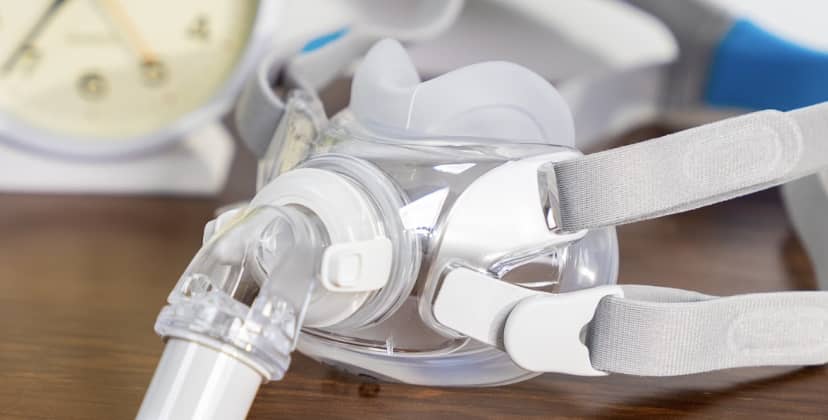
While the ResMed AirFit F30 is somewhat bulky — a common trait for full-face CPAP masks — the streamlined design and low profile ensure plenty of airflow without covering your forehead or obstructing your vision. You can choose between small and medium cushion sizes for added comfort.
-
Pros
-
Smaller footprint than most full-face masks
-
Hybrid design cradles the nose without putting pressure on the bridge
-
Streamlined profile ensures a clear line of sight
-
-
Cons
-
Only two cushion sizes
-
Contains magnets, making it unsafe to use near implanted medical devices
-
Price
$170
If you primarily breathe through your mouth, a full-face mask is probably the most comfortable option for your CPAP therapy. ResMed’s AirFit F20 is more streamlined than the majority of competing full-face models on the market. The straps don’t cover your forehead or block your eyes, allowing you to wear glasses and watch television during your therapy without sacrificing steady airflow.
What Does It Do?
Like other full-face masks, the AirFit F30 is ideal for people who’ve been prescribed high pressure levels for their CPAP therapy. The mask forms a tight seal around the nose and mouth with silicone cushions padding both nostrils — this helps ensure air won’t leak. An elbow port for the connective tubing allows you to change sleep positions without compromising the secure fit.
The straps are adjustable and outfitted with magnetic clips, so putting on and taking off the mask is a hassle-free process. Cushions are available in small and medium sizes. You can use the sizing gauge on Sleep Doctor’s product page for the mask to determine the most comfortable option based on your facial dimensions.
Who It’s Best for
The AirFit F30’s streamlined design makes it suitable for people who otherwise might not like wearing full-face masks, such as those who wear glasses or enjoy watching television in bed before falling asleep. Side sleepers can also benefit from the mask’s excellent freedom of movement, which is due in large part to the elbow port connection for the connective tubing. Those who don’t need high pressure levels during CPAP can probably get by with a nasal or nasal pillow mask, but you should discuss the best options with your doctor.
Approachable pricing and free shipping within the contiguous U.S. make the ResMed AirFit F30 a solid choice for budget-conscious shoppers. You’ll also receive a 15% discount on your order if you sign up for a subscription with Sleep Doctor. New and unopened masks may be returned within 60 nights of the delivery date. You’ll receive a full refund during this time frame, but are responsible for return shipping charges.
Disclaimer: In November 2023, ResMed issued a safety notice cautioning that the magnetic clips on this model and other ResMed masks should be kept at least 6 inches away from any implanted medical device that may be affected by magnets, including pacemakers and insulin pumps. The company also warns that other metallic implants such as valves, stents, and certain dental implants may be impacted by the magnetic clips.
What Are the Different Types of CPAP Masks?
The different types of CPAP masks are full-face masks, total face masks, nasal and nasal pillow masks, and oral masks.
CPAP masks are categorized by how they fit on your face, and each type has benefits and drawbacks. Your doctor or sleep specialist can help determine what type of mask best meets your needs for sleep apnea treatment.
Full-Face Mask
A full-face mask delivers air to both your nose and mouth. To create a tight seal against your face, it usually extends from the area below your lower lip up to the bridge of your nose. The mask is normally held in place by straps that go behind your head.
Full-face masks can generally accommodate higher air pressure settings and are often recommended if you frequently breathe through your mouth. However, these masks are bulkier and may feel less comfortable when sleeping on your side.
Total Face Mask
A total face mask goes over your entire face, from the chin to the forehead. These masks provide pressurized airflow through both the nose and mouth.
Because of their size, total face masks are not commonly used, but they may be beneficial for people who require high air pressure levels or who struggle obtaining a good seal with other types of masks.
Nasal Mask
A nasal mask has a relatively low profile that can foster more comfort and is easier to wear when sleeping on your side. While most nasal masks extend from just above the mouth to the bridge of the nose, some nasal cradle models rest beneath the nose and seal against the nostrils.
A nasal mask may not be a good option if you typically breathe through your mouth or are regularly bothered by nasal congestion.
Nasal Pillow Mask
Nasal pillow masks feature soft silicone or gel inserts that seal inside the nostrils. These masks tend to have a very low profile, so they rarely block vision or feel bulky or heavy. However, this style may not be effective or comfortable if you breathe through your mouth or require a high CPAP air pressure setting.
Oral Mask
An oral mask only covers the mouth. Oral masks are not regularly used, but they may be recommended if you breathe almost entirely through your mouth. For example, an oral mask may be effective if you have chronic congestion that limits airflow through your nose.
How to Choose a CPAP Mask
If you’re in the market for a new CPAP mask, knowing what to look for when shopping can help you find the best mask for your needs.
Doctor’s Orders
When looking for a CPAP mask, start by taking into account any recommendations from your doctor. To effectively treat sleep apnea, you need a mask that is appropriate for your breathing patterns. Your health care team can help guide you to a mask that works well and is also comfortable.
Sleeping Position
Your sleeping position can directly affect the type of CPAP mask that you can comfortably wear. If you sleep on your side, you may struggle with a bulky mask or a mask with headgear that runs along the side of your face. When sleeping on your stomach, you normally need a lower-profile mask. If you are a back sleeper, you may prefer a mask with straps that don’t go behind your head.
Fit and Size
Having the right size mask that fits properly creates a seal so that pressurized air from the CPAP machine flows into your airway without leaking. Headgear and straps can also affect how well the mask fits against your face. You may need to try out a few different mask models to find one that has the right size and fit.
Mask Comfort
You want to find a CPAP mask that is comfortable enough to wear for many hours every night. Comfort can depend on a mask’s materials and design, including how it feels against your face, whether it obstructs your vision, and where the straps are positioned. Consider your personal comfort preferences and issues like allergies or sensitive skin when choosing a mask.
Machine and Hose Compatibility
Your CPAP mask must be compatible with the tubing of your CPAP machine, and the tubing and mask have to connect without any air leaks. While most CPAP hoses are designed for universal compatibility, some travel CPAP machines have proprietary tubing that’s only compatible with certain masks from the same brand.
Product Recalls
Recalls involve pulling a product off the market because of a safety concern. For example, in 2022, Philips Respironics issued a product recall for several mask models due to concerns over magnetic clips negatively interacting with implanted medical devices. More recently, ResMed issued a safety notice regarding a similar magnet issue. Speak with your doctor if you’re concerned about the safety of any CPAP mask or machine you’re considering.
Where Can You Buy a CPAP Mask?
You can buy a CPAP mask online or from a brick-and-mortar CPAP equipment supplier. Some sleep clinics may also offer CPAP masks.
Shopping online offers convenience, a wide selection, and competitive pricing. Buying a mask from a sleep specialist can help ensure that it’s compatible with your device. Shopping in a retail store lets you see a mask in person before making a purchase.
How Much Does a CPAP Mask Cost?
Most CPAP masks cost between $50 and $200. The price depends on the type of mask and its materials and features. If you have health insurance, your plan may cover some or all of the costs of a CPAP mask.
Do You Need a Prescription to Buy a CPAP Mask?
You need a prescription from a licensed medical provider in order to buy a CPAP mask. Regardless of whether you’re shopping online or in person, we suggest having a copy of your prescription ready.
Although a complete mask requires a prescription, replacement components, such as mask cushions or headgear, can be purchased without a prescription.
Will Insurance Cover the Cost of a CPAP Mask?
Many health insurance plans, including Medicare and Medicaid, provide coverage for CPAP masks under certain conditions.
Insurance plans often require your doctor to provide documentation showing that you need CPAP therapy and are using your device consistently. Even with coverage, you may be responsible for out-of-pocket costs for a deductible or coinsurance.
A few steps may help when trying to get insurance coverage for a CPAP mask:
- Ask your doctor and insurance provider about coverage for CPAP accessories.
- Request that any information about your policy be provided in writing.
- Check with your CPAP mask supplier about whether they send bills directly to your insurance provider.
- Keep receipts and any other paperwork related to your CPAP mask purchase.
- If you have to submit an insurance claim, make sure to provide all the requested documentation.
Dive Deeper: In-Depth CPAP Mask Guides
If you’ve decided on a mask type but would like to explore more options, check out our team’s hand-picked selections for specific types of CPAP masks.
Data-Driven Results You Can Trust
Our expertise is sleep, and our priority is offering you dependable and data-driven recommendations to help you sleep better. Years of experience in the industry enables our team to identify the benefits, drawbacks, and key features of different CPAP accessories. We employ a thorough methodology and personally research a large range of CPAP masks, allowing us to find the best overall mask and the best options in specific categories.
Frequently Asked Questions
While cleaning recommendations for CPAP masks may vary depending on the manufacturer and model, general best practices involve a daily wipe down and a deeper cleaning once a week. Specialty CPAP cleaning wipes provide a convenient way to keep a mask clean in between more thorough washings. These wipes are particularly helpful for masks with memory foam cushions that shouldn’t be submerged in water.
Every week, take the mask components apart and wash them with warm water and mild liquid soap. After rinsing off any residual soap, let the components air dry before reassembling them.
Never use harsh cleaners like bleach when washing your CPAP mask. Additionally, avoid CPAP cleaners that use ozone gas or ultraviolet light, as the Food and Drug Administration has issued a warning regarding their safety and efficacy.
The key to keeping a CPAP mask from leaking air is making sure that it forms a tight (but not too tight) seal with your face. This means that you need a mask that’s the right size as well as appropriate headgear to hold the mask in place.
If you have a nasal mask or a nasal pillow mask, you may need to take steps to keep air from leaking out of your mouth. A common way to prevent mouth leak is to wear a CPAP chin strap that holds your mouth closed during sleep.
You can buy a CPAP mask online. Shopping online lets you browse multiple mask options and easily compare prices from different retailers. When looking for a CPAP mask online, it is helpful to know the specific model of CPAP device you use because you will need to make sure that you purchase a compatible CPAP mask.
General guidelines suggest replacing CPAP mask cushions or nasal pillows every three months and mask frames and headgear every six months. However, you should replace your mask if it becomes excessively dirty, damaged, or unable to maintain a seal against your face.
We often find that it’s helpful to have a backup CPAP mask available. This lets you continue CPAP therapy if something happens to your primary mask or if you need extra time to clean and dry your mask.
You can sleep comfortably with a CPAP mask by finding a high-quality mask that fits well on your face and stays in place when you are in your desired sleeping position. Don’t be surprised if you have to try a few different mask models to find one that doesn’t cause discomfort or irritation.
Even with an ideal mask, it can still take time to get used to wearing a CPAP mask throughout the night. To get acclimated, we suggest wearing your mask at different times when you’re awake, such as when reading or watching TV.
A full-face mask is often the best CPAP mask for people who have allergies that cause frequent nasal congestion. Though less commonly prescribed due to low adherence rate and the potential for dry mouth, an oral mask may be an option for a person with both sleep apnea and severe nasal congestion.
CPAP airflow can be blocked by a stuffy nose, so nasal masks and nasal pillow masks may not be a good fit if you have recurring allergy symptoms. Check with your doctor for mask recommendations and suggestions for any medications that may help with allergies.

Still have questions?
Our product experts have extensive experience testing just about every sleep product on the market.
Send an email to [email protected] with your questions and we’ll help you find exactly what you’re looking for.

